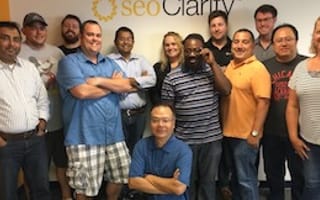
Google’s search engine, launched nearly 20 years ago, completely changed how consumers discover information. By using links to a website as a proxy for its importance, the scrappy upstart proved significantly more adept at unearthing relevant information than its competitors, who subsequently fell out of relevance.
Today, the search industry is undergoing a second revolution, in which search engines highlight a broad range of relevant content, rather than a ranked list of pages about precisely what you searched for.
That presents a challenge for companies vying for coveted spots among search results — but it’s also a window of opportunity for brands with the knowhow to capitalize on it.
“It’s a really exciting time for brands,” said Mitul Gandhi, co-founder and chief architect at seoClarity. “They can be winning those moments.”
His company’s platform aggregates data from sources across the web, employing machine learning to understand the kinds of content brands can produce to attract broader audiences.
For instance, if your company sells avocados to consumers, seoClarity could identify avocado-related content opportunities, like recipes for guacamole or avocado toast, and help you ensure that the content delivers on its promise. It also ensures that technical factors like speed, accessibility and indexability are up to par.
Once the content is live, seoClarity also tracks how it performs, as well as how it can be tweaked to account for changes in the search landscape.
Gandhi said the past two years have been the most exciting time in the industry since he got started in 2000.
“Two years ago, there was no good experience around voice search, but now the voice experience is getting better every day,” he said. “Search engines are also getting so much better at understanding what I want, based on location, who I am and the time of day.”
Search engines have also gotten much better at distinguishing between relevant content and content that is merely engineered to appear relevant.
“Until a few years ago, search engines understood the world like a toddler would. If you said a word loudly enough, they would think it was important,” he said. “Today, they understand more like teenagers, with context, history and the ability to pick up on things like sarcasm.”
For companies like Gandhi’s, the upshot is that teaching companies how to create relevant content has become more important than finding ways to trick search engine algorithms.
An early adopter of this approach, seoClarity has grown substantially over the past few years. Bootstrapped since its founding, the company has just over 50 employees at its Chicago headquarters — a number Gandhi said might double in the year ahead.
The company has competitors on both coasts, but Gandhi believes its Chicago headquarters are a major competitive advantage.
“It has the talent and the connectivity with the world, but, most importantly, it has the values of working hard and building something together,” he said. “Every person on our team comes in with the objective of creating something valuable for our clients.”
Image via seoClarity.
What's your company's story? Drop us a line or tweet us @BuiltInChicago




